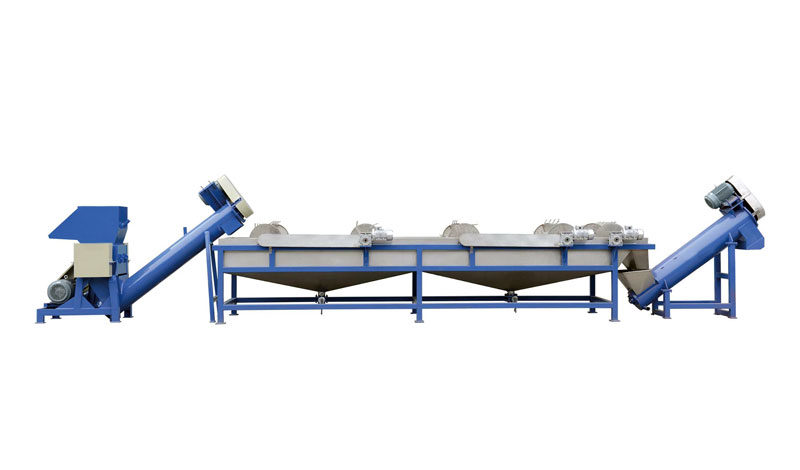

Contact us

Plastic has become an integral part of our modern lives […]
Plastic has become an integral part of our modern lives. From packaging materials to consumer products, its versatility and affordability have made it a preferred choice for manufacturers across various industries. However, the journey from raw plastic pellets to finished products involves several crucial steps, and one of the key processes in plastic manufacturing is mixing. This is where mixer machines come into play, revolutionizing the way plastic is processed and shaping the future of the industry.
Plastic mixer machines are advanced devices designed to blend and mix different types of plastic materials, additives, and colorants to create a homogeneous mixture. These machines come in various sizes and configurations, catering to the specific needs of different industries. Whether it's the production of plastic bottles, automotive parts, or electronics components, mixer machines play a vital role in achieving consistent quality and performance.
The primary function of a mixer machine is to distribute additives and colorants evenly throughout the plastic resin. This ensures that the final product exhibits uniform color, strength, and durability. The mixing process also facilitates the dispersion of fillers and reinforcing agents, which enhance the mechanical properties of the plastic. By achieving a well-blended mixture, mixer machines contribute to reducing defects, improving product consistency, and increasing overall production efficiency.
One of the key challenges in plastic mixing is achieving the desired blend while maintaining the integrity of the plastic materials. Mixer machines employ different mechanisms to overcome this challenge. Some machines use a batch mixing process, where all the materials are loaded into the mixer at once and blended together. This method is ideal for smaller production volumes and allows for precise control over the mixing parameters. Other machines utilize continuous mixing, where materials are fed into the mixer continuously, ensuring a steady output of the blended plastic. Continuous mixing is suitable for high-volume production, offering increased efficiency and reduced downtime.
In recent years, advancements in mixer machine technology have led to the development of innovative features that further enhance their performance. For instance, many modern mixer machines are equipped with computerized control systems, allowing operators to monitor and adjust mixing parameters in real-time. This level of control ensures greater precision, consistency, and flexibility in the mixing process, ultimately resulting in higher quality products. Additionally, automated feeding systems, integrated sensors, and sophisticated software algorithms enable the optimization of mixing parameters, minimizing material waste, and reducing energy consumption.
The applications of mixer machines extend beyond traditional plastic manufacturing. They are also widely used in the recycling industry, where they play a vital role in transforming post-consumer plastic waste into reusable materials. Mixer machines can efficiently blend different types of plastic waste, additives, and compatibilizers to create recycled plastic compounds with properties similar to virgin plastic. This not only reduces the environmental impact of plastic waste but also promotes a circular economy by enabling the reuse of valuable resources.
Furthermore, mixer machines contribute to the development of new and advanced materials. By facilitating the blending of different polymers, additives, and nanoparticles, these machines enable the creation of composite materials with unique properties. For example, mixers can be used to incorporate flame retardants into plastic, making it safer for various applications. Similarly, they can help create biodegradable plastics by blending biopolymers with traditional plastics, offering sustainable alternatives to conventional materials.
In conclusion, mixer machines are the unsung heroes of the plastic industry, playing a crucial role in achieving the desired properties of plastic products. From ensuring consistent color and strength to enabling the recycling of plastic waste, these machines have revolutionized the way plastic is processed. With ongoing advancements in technology, mixer machines are expected to become even more efficient, precise, and environmentally friendly in the future.

HIGH SPEED MIXING AND DRYING MACHINE
Especially suitable for drying and mixing power,crushed material and water recycling material.
1.The high speed mixer can release the water molecules in the raw material by using the high speed rotating friction heating, so as to achieve the dual functions of efficient drying and uniform color mixing. It is widely used in the drying/color mixing processing of granule, flake, powder, pulverized or washed recycled material.
2.Easy discharging, discharging without starting the motor; With automatic temperature control, timing, overload protection and other automatic functions; Double-layer stainless steel insulation barrel, blade, brake, barrel cover and so on are stainless steel materials.
3.The bottom of the barrel body is designed with conical body without dead Angle, and staggered blades are used to make the mixing and friction of raw materials faster, the utilization rate of motor is higher, and the cleaning in the barrel is easier.
4.Inertia wheel design, can crush the material due to moisture agglomeration; Different power motors can be configured according to different needs to achieve different drying effects.

Copyright © Yuyao Lvdao Plastic and Rubber Machinery Co.,Ltd. Plastic Granulation Line Supplier 浙ICP备11026885号-3



